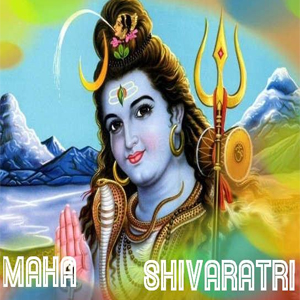|
Maha-Sivaratri" is a Hindu festival observed on the night of the fourteenth day of the dark half in the month of 'Magha', in Tamil 'Maasi', corresponding to the English months 'February—March', in honour of Siva, one of the Hindu Trinity, representing the destructive aspect in the universe.Though generally, the night time is considered sacred and suitable for the worship of the feminine aspect of' the deity and the day time for that of' the masculine, yet on this particular occasion Siva is worshipped during the night time, and as a matter of fact, it is specially enjoined to be observed then. The observance of the Vratha is believed to secure for the devotee immunity from the eftects of sin committed either wittingly or unwittingly. The night is divided into four quarters, each quarter going by the name of a Jama called also Yama and pious people keep awake during every one of it , worshipping Iswara.

It is said that the whole world was under destruction once and the Goddess Parvati worshipped her husband Siva then and prayed to him that the Jivas (living souls) remaining in space like particles of gold dust in a lump of wax during that long period of pralaya (deluge) night, should, when they became active once again and are in the enjoyment of their short day and night, have his blessings if they but worshipped him just as she did then, and her prayer was accordingly granted.The night fixed for the worship of Iswara by mortals by Parvati was named Maha-Sivaratri or the great night of Siva, since pralaya is brought about by him and hence the period is really his night from the great night or pralaya which was the cause for the origin of this Sivaratri.
The people who observe this Sivaratri- Vratha take only single meal during the day previous to the Vratha day and sleep in clean place during the night. In the morning of the Vratha day they take a bath in the waters of a sacred river, and then go to witness the divine worship in a Siva temple, and at night offer worship to Siva during every one of the four Yamams. Night long vigil on Sivaratri day,watching the sacred ablutions of Siva Linga at the temple,is the core of the Sivaratri festival.The Rudra Japa Abhisheka of Siva Linga resounds the multifacted glory of Lord Siva,who is also called Asutosh or One who is easily pleased by copius ablutions with water, the cheapest available commodity.We should remember that water in essence is Prana Sakti or life force. Such an observance of Siva Ratri will really bestow on the devotee the greatest grace of Lord Siva, the auspicious knowledge of Atma Jnana. Besides the devotee is also blessed with material prosperity the items of which are beautifully listed in the ChamakaMantra uttered on this occasion.
There is also a myth emphasizing the importance of the worship of Siva during the Sivaratri night and it is in brief as follows :
Once there was a hunter, and he one day went into the forest to procure meat for his family by hunting some animal. He wandered up and down in the forest from morning till night in search of game but was unable to shoot any. At last, when night overtook him, he climbed up a Bael tree to escape from a wild animal that was pursuing him, being roused from its lair by the hunter. The animal was lying down at the foot of the tree quite certain that the man would fall down either from sleep or from exhaustion, and that he might eat him. The hunter, exhausted as he was from his exertions and hunger, wished to scare away the animal by throwing handful of bael leaves. These leaves dripping with water on account of the recent shower, fell on a Siva-Lingam that was near. The night happened to be the Maha-Sivaratri night. He had fasted during the whole day since he could not find anything to eat. The drenching rain constituted a bath and his action of throwing the bael leaves on the Siva-Lingam, the worship of Siva on the Sivaratri night. Though his actions were not intentional to worship Siva, yet he is said to have gained heaven as he had observed the Sivaratri - Vratha unwittingly.
The basic principle underlying the observance of the Maha-Sivaratri Vratha appears to be to emphasize the fact that death is sure to follow birth, night is sure to follow day,Pralaya, active cosmic life and so on, and consequently people should always bear in mind while enjoying the one its opposite and regulate their life accordingly. They should not be elated at success nor should they allow themselves to be carried away by despair at failures but always have trust in God and worship him.
|